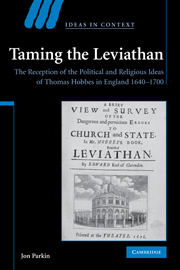 Taming the Leviathan
Taming the Leviathan Book contents
- Frontmatter
- Contents
- Acknowledgements
- Introduction
- 1 Reading Hobbes before Leviathan (1640–1651)
- 2 Leviathan (1651–1654)
- 3 The storm (1654–1658)
- 4 Restoration (1658–1666)
- 5 Hobbes and Hobbism (1666–1675)
- 6 Hobbes and the Restoration crisis (1675–1685)
- 7 Hobbism in the Glorious Revolution (1685–1700)
- Conclusion
- Bibliography
- Index
- Ideas in Context
Conclusion
Published online by Cambridge University Press: 05 May 2010
- Frontmatter
- Contents
- Acknowledgements
- Introduction
- 1 Reading Hobbes before Leviathan (1640–1651)
- 2 Leviathan (1651–1654)
- 3 The storm (1654–1658)
- 4 Restoration (1658–1666)
- 5 Hobbes and Hobbism (1666–1675)
- 6 Hobbes and the Restoration crisis (1675–1685)
- 7 Hobbism in the Glorious Revolution (1685–1700)
- Conclusion
- Bibliography
- Index
- Ideas in Context
Summary
By 1700 the cumulative effect of five decades of critical engagement with Hobbes's writings had produced the images of the philosopher with which I began this book. Hobbes had attained a possibly unique position in the English imagination of the time. He had become a household name, but one associated with atheism, immorality, selfish behaviour, a poor view of human nature and unacceptable political views. Taken together these views constituted ‘Hobbism’, a well-documented creed to be detested by all God-fearing people and a set of views associated with a minority of ‘Hobbists’.
These debased disciples fell broadly into two categories; the libertine and the hypocrite. The libertine, typically young, always immoral and often drunk, is a stock figure by the later seventeenth century, a lively combination of Scargill and Rochester. Robert Dixon captures him in his Canidia:
The brave young Hobbist scorns and flies
The Inns of Court and Universities,
He vilifies the Man in Black,
Makes the poor Curate drunk with Sack.
In 1688 Jane Barker spots him with his friends up to no good, exemplifying the corruption of the town, when they:
Kick Tavern Boys, and Orange-Wenches wooe,
Are Machiavellians in a Coffee-house,
And think it wit a poor Street-Whore to chouse;
And for their Father Hobbs will talk so high,
Rather than him they will their God deny …
The other kind of Hobbist is the similarly irreligious but more calculating hypocrite whose superficial conformity to social norms and values conceals his adherence to the controversial philosopher.
- Type
- Chapter
- Information
- Taming the LeviathanThe Reception of the Political and Religious Ideas of Thomas Hobbes in England 1640–1700, pp. 410 - 416Publisher: Cambridge University PressPrint publication year: 2007
